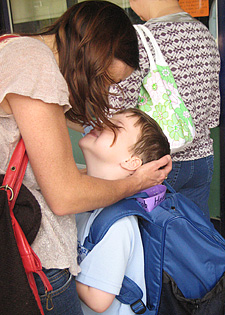 Maia's life is a patchwork quilt of appointments, research and therapies for her developmentally delayed son, but every square of time represents a labour of love.
Maia's life is a patchwork quilt of appointments, research and therapies for her developmentally delayed son, but every square of time represents a labour of love.
Carers' Week aims to focus the nation's attention on the millions of people like Maia, who devote their lives to the service of others.
Six-year-old Jacob was born with Occular Motor Apraxia, a rare condition that has affected the development of his eyesight, balance and speech.
"He's a very normal, happy boy," Maia says, "but he just has a few more hurdles to overcome.”
"We don't think of Jacob as having a disability " he's just Jacob to us. He is the son God has given us and, though there have been lots of struggles, they've been outweighed by the blessings. We've been working to help Jacob grow, but God has been using Jacob to grow us."
However parents are not the only ones doing the hard yards of caring for people with special needs.
As National Carers’ Week continues, Anglicare Sydney have said children as young as eight are caring for their parents with little or no support or acknowledgement from their community.
According to the Anglican community organisation, thousands of carers of all ages are quietly caring for their loved ones who are ill, frail, aged or have a disability, and are often too proud, ashamed or unable to share their load.
"We see children who have become mini-adults because of the responsibility on their young shoulders," says Anglicare researcher Susan King.
"We also see wives, husbands, parents who have been caring for their loved one for decades and can no longer continue their caring role because they themselves have become frail with age.
"To them it's just what being part of a family means. But quite often you see carers " especially ageing carers " concerned about the future when they can no longer care for their loved ones."
Who cares for carers?
Furthermore, the lack of practical and financial support for carers and the resultant sense of isolation can compound mental health issues, exhaustion and stress levels that many carers already face.
Around 2.5 million Australians aged 15 years and over care for someone at home because of a disability or old age.
According to research released by the Australian Bureau of Statistics this month, 42 per cent of all primary carers were caring for a spouse/partner; 26 per cent were children caring for a parent; 23 per cent were parents caring for a child.
By 2012 the Australian Institute of Health and Welfare estimates there will be more than 600,000 primary carers for the elderly, ill or those with a disability.
According to Anglicare Sydney, social support is integral to the sustainability of carers. However, a recent client carer survey by the organisation revealed that almost one in three carers considered they receive no support at all from friends, one in four felt the same way about their family and just over 20 per cent considered they received no professional support from outside services.
"A picture of doing it tough and on their own is the one that emerges for many carers in our research findings," Ms King said.
"Providing both flexible formal and informal care to these carers is one of the strongest ways to value their contribution."























